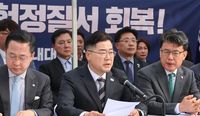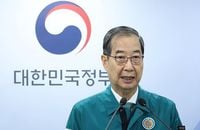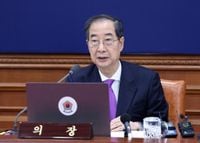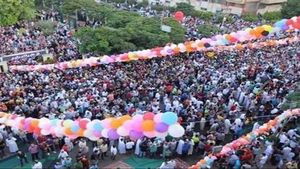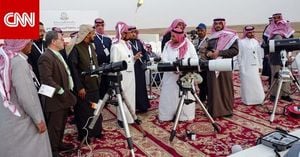The political landscape in South Korea is heating up as the Democratic Party ramps up pressure on Prime Minister Han Duck-soo and the People Power Party regarding the appointment of Justice Ma Eun-hyuk to the Constitutional Court. On March 26, 2025, the Democratic Party criticized Han, asserting that his response to the Constitutional Court's judgment on Ma's appointment would serve as a litmus test for the current government's respect for the Constitution.
Kang Yoo-jung, a spokesperson for the Democratic Party, expressed discontent with Han's lack of response to the court's ruling, stating, "Prime Minister Han Duck-soo tells the public that the decisions of the Constitutional Court must be respected, yet he remains unresponsive to the court's judgment that Ma Eun-hyuk should be appointed." This criticism underscores the tension between the government and the opposition, particularly surrounding constitutional adherence.
During a cabinet meeting on March 25, Han Duck-soo focused on addressing the global trade war and the economic challenges facing South Korea but notably avoided discussing the sensitive issue of Ma's appointment. He emphasized the importance of national security and the need for cooperation with the National Assembly to tackle pressing national challenges. "Our mission at this moment is to protect the safety of the people and secure national interests amidst the trade war," he stated, further pledging to utilize his experience in trade and diplomacy to navigate the challenges ahead.
However, the Democratic Party is not letting the matter rest. Park Chan-dae, another Democratic Party spokesperson, warned that Han's failure to appoint Ma could lead to impeachment proceedings. He pointed out that the Constitutional Court had already ruled that the failure to appoint the justices recommended by the National Assembly constituted a violation of the Constitution. "If Prime Minister Han does not appoint Justice Ma immediately, it could be grounds for impeachment," he asserted, emphasizing the urgency of the situation.
The political stakes are high, with the Democratic Party considering a dual impeachment strategy targeting both Han and Deputy Prime Minister Choi Sang-mok, who has also been criticized for his role in the delay of Ma's appointment. Kwon Seong-dong, a spokesperson for the People Power Party, countered the Democratic Party's claims, arguing that the opposition's tactics were leading to unnecessary political chaos. He stated, "The indiscriminate use of impeachment is causing significant harm to the nation and its governance, especially during a critical period of leadership transition in foreign affairs."
As the political tensions rise, there are mixed feelings within the Democratic Party itself. Some members have voiced concerns that the frequent calls for impeachment could lead to public fatigue and backlash. Lee So-young, a Democratic Party lawmaker, suggested that further impeachment attempts might not yield practical benefits and advocated for restraint. "The public is feeling fatigued by the frequent impeachment discussions, and it may be wise to refrain from additional actions that could prolong the current political turmoil," she remarked.
The impasse over Ma's appointment has become a focal point for both parties, encapsulating broader issues of governance, accountability, and constitutional fidelity. The Democratic Party's insistence on immediate action reflects a strategic maneuver to regain political momentum while holding the government accountable for its constitutional obligations.
As the situation unfolds, the implications of these political maneuvers will likely resonate beyond the immediate appointment of a single justice. The ongoing debates over constitutional adherence and the role of the judiciary in South Korea's democracy are crucial, especially in a time of heightened political sensitivity.
In the meantime, Han Duck-soo continues to navigate the complexities of his role as Prime Minister, balancing the demands of economic stability with the pressures of political accountability. His administration's handling of the Ma Eun-hyuk appointment could very well define its legacy in the eyes of the public and future governance.
With the Democratic Party threatening impeachment and the People Power Party defending its positions, the coming days will be pivotal in determining not only the fate of Justice Ma but also the broader trajectory of South Korean politics. Both sides are gearing up for a contentious battle over the interpretation of constitutional duties and the responsibilities of elected officials, making it clear that the political stakes have never been higher.
As this political drama continues to unfold, observers will be closely watching how the government responds to the mounting pressure and whether the delicate balance of power can be maintained without further escalating tensions in the already polarized political climate.
